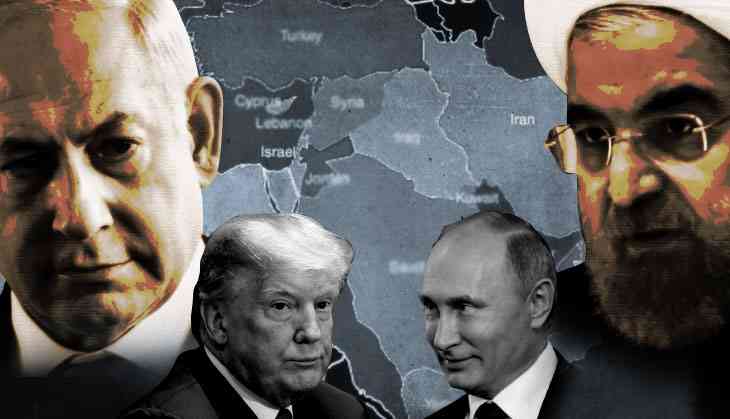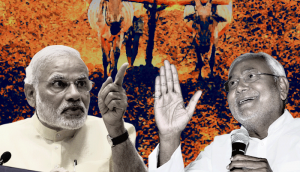
In the wake of the United States exit from the Joint Comprehensive Plan of Action (JCPOA), the gamble underway between Israel and Iran in Syria might end up into a dangerous game of a direct military confrontation.
Though the Iranian Revolutionary Guards might be restrained by Putin’s Russia to attack Israelis directly, the hardliners in Tehran would most probably choose the path of war instead of diplomacy.
The million-dollar question is if the Trump administration will be willing to take the Middle East into war in order to defend Israel and Saudi Arabia? No doubt, if a regional war does break out, Trump and the hawks in Washington will give their total support to Israel on all fronts.
As a matter of fact, after returning to Tel-Aviv, Israeli Defence Minister Avigdor Liberman, informed Benjamin Netanyahu that he had received a “green light” from the White House in security matters. Hopefully, for now, the missile exchange between Iran and Israel has not developed in a major confrontation.
However, if Israel continues its attacks, Syria and its Iranian ally might think of sending their missiles or rockets way beyond the Golan Height into the Israeli territory. The deeper consequences of such an act will be accompanied by un-intended geo-political aftermaths.
A destabilised, conflicted and bloody Middle East, is not exactly what Russia or China are looking for. Putin is close to both Israel and Iran, but the time for any Russian mediation has passed, especially because of Trump’s anti-Iranian stand.
Russia and China know quite well that Trump's ultimate objective is not to leverage the Europeans to pressure Iran for a better deal, but to go directly for a regime change in Tehran. But for the time being Trump and his collaborators have not been joined by the Chinese, Indians, Russians, and the European Union to join them in a direct confrontation with Tehran.
Let us be frank, it is not because Trump’s wild threats against North Korea have opened a diplomatic space that he will use the same magic recipe for Iran.
Certainly, the prospect of a long-awaited peace for the Middle East is not for tomorrow. To Israeli and Saudi ears, Trump’s 8 May exit from the Iran deal had a very familiar ring of bringing Iran to its knees.
To be sure, Iran and North Korea are very different: the latter is a nuclear power and not mixed up in hot wars and proxies like Iran. As for South Korea, unlike Netanyahu’s Israel, it is not a bellicose state which pushes toward a confrontation that would likely be escalating rather than calming down the geo-political situation of the world.
We should not forget that the oil markets will tolerate very poorly the vitriolic scenario of an eventual confrontation between Iran and Israel. It is true that the Bloomberg’s spot market price reacted to President Donald Trump’s decision to withdraw from the 2015 Iran nuclear deal just two cents above where it began the day of the announcement.
Maybe one of the reasons to this reasonable calm is that Saudi Arabia had already declared its willingness to tap into its own oil capacity to moderate the markets if needed. However, the main risk is not removing Iranian oil exports from the market, but that turning up the heat on Iran would force Iranian Revolutionary Guards to act aggressively and recklessly in the Persian Gulf.
One way or another, the future does not look very rosy, either for the Islamic Republic of Iran in particular or the Middle East in general. Trump’s new Middle East imbroglio could be even more costly that the trillions of dollars along with hundreds of thousands of lives which costed for the American invasion of Iraq.
In terms of short-term consequences, Iran will assuredly be forced to rely on its political allies in South Asia and East Asia. The Chinese have been present in Iran for the past 30 years. Trade with China has been raised to $28 billion.
Though Chinese companies are not beyond the reach of American sanctions, they seem to be taking over some of the European contracts. For example, Total SA -- which has a contract to develop the South Pars gas field together with China National Petroleum Corporation -- has underlined it would pull out if the US re-imposes sanctions. In that event, this is a win for the Chinese who would take over Total’s share.
With the Europeans out, China will once again be at relations with Iran from a fresh strategic perspective that includes moving towards a new Silk Road. As a result of Trump’s withdrawal from the deal of 2015, once again economic accords enacted between the Iranians and the Americans and their European allies during the Obama administration and all the lifted sanctions on the export of goods including aircraft and aircraft parts will be put into question.
Under such a scenario, disagreements between the United States and its European allies, who may no longer see the United States as a trustful partner, will likely increase while Iran will move closer to China and Russia.
It is hard to see how this new gamble will serve the interests of anyone and the future of stability in the region, even those who are looking for a regime change in Iran.







![BJP's Kapil Mishra recreates Shankar Mahadevan’s ‘Breathless’ song to highlight Delhi pollution [WATCH] BJP's Kapil Mishra recreates Shankar Mahadevan’s ‘Breathless’ song to highlight Delhi pollution [WATCH]](http://images.catchnews.com/upload/2022/11/03/kapil-mishra_240884_300x172.png)

![Anupam Kher shares pictures of his toned body on 67th birthday [MUST SEE] Anupam Kher shares pictures of his toned body on 67th birthday [MUST SEE]](http://images.catchnews.com/upload/2022/03/07/Anupam_kher_231145_300x172.jpg)






